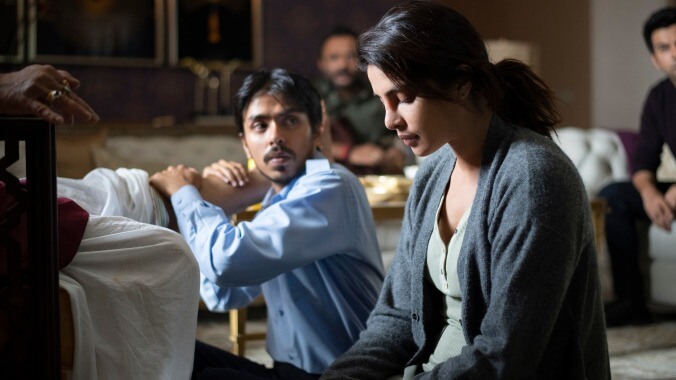The White Tiger plays like Netflix prestige CliffsNotes of an acclaimed bestseller

Note: The writer of this review watched The White Tiger on a digital screener from home. Before making the decision to see it—or any other film—in a movie theater, please consider the health risks involved. Here’s an interview on the matter with scientific experts.
“America is so yesterday,” enthuses Balram (Adarsh Gourav), and “India and China are so tomorrow.” He’s writing an email to Wen Jiabao, the premier of China, drawing a connection between the two nations ostensibly to pitch the visiting premier on his taxi business. But he’s also positioning his home country as an heir to America’s supposed upward mobility—one that can be even more selective, arbitrary, and cruel in laying out its narrow, nigh-impossible path to lasting success. This makes The White Tiger, based on the 2008 Booker Prize-winning novel by Aravind Adiga, a fitting adaptation for Iranian-American writer-director Ramin Bahrani. Bahrani has become a studious chronicler of American economic stagnation, using movies like Man Push Cart and 99 Homes to show people at work, digging into the hows and whys of failing to get ahead in a rigged system.
Balram would likely look upon many of Bahrani’s other characters with great envy. Born into a low caste, he has an aptitude for schooling that’s quickly shunted aside when he needs to contribute an extra pittance for his family and is sent to work as a child. He sees a possibility for escape through servitude; his grandmother agrees to let him leave their small village and pursue driving lessons, so that he can get a job playing chauffeur for a rich family and send most of his money home. That’s exactly what he does, and eventually finagles a plum spot with the more Americanized members of a wealthy clan: Ashok (Rajkummar Rao) and his largely U.S.-raised wife, Pinky (Priyanka Chopra Jonas). Balram travels with them to Delhi, where the couple stays in a posh hotel and he joins the parallel community of drivers and servants who dwell in the parking garage below.
The dynamic between Balram and his employers is sharply observed. The couple considers themselves more modern and enlightened than the rest of their family, insisting that Balram not call Ashok his “master,” and occasionally treating him something like a friend. At the same time, they take turns “encouraging” him with maximum condescension and sometimes outright berating him when they deem it necessary. Their supposed kindness is a convenience, and not to Balram. It’s all exacerbated by a mid-movie turn with overtones of The Great Gatsby, minus a mysterious figure of intoxicating charisma. Balram doesn’t need a Gatsby type to seduce him into a world of wealth; he gets starry-eyed at the sight of any meager opportunities that exist above the poverty line. To convey the lack of glamour, India isn’t shot with the usual western visual clichés; the skies frequently look overcast, and there’s barely a vivid orange-and-brown color scheme to be found. Delhi isn’t exoticized into a tourist brochure.
The White Tiger makes all of these plot and thematic checkpoints compelling while holding its material at a remove—and from a distance, only flashes of personality are visible (usually through the occasional expressive close-up). Bahrani has struggled on a bigger canvas before, notably with the sprawling, awkward melodrama At Any Price. Here, a novel provides a stronger spine, thickened by pages and pages of narration. The voiceover and quick pace lay the story out clearly, but they also expose how little affinity Bahrani has for the breathlessly energized, darkly funny, half-montage style employed by filmmakers who have tackled similar material, like Martin Scorsese or even Danny Boyle, whose Slumdog Millionaire will be an obvious point of reference for at least some American audiences. If that comparison seems facile, it’s one the movie itself cleverly makes, with a pointed aside about how no game-show prize awaits its hero.
Fair enough, but is Balram’s ending far less predictable? On the page, with more room to sink into its narrator’s psychology, maybe it is—or at least less preordained. Here, it takes Balram a full 90 minutes to verbalize his discontent with his selfish masters, and finally circle back to a bunch of metaphors he set up at the top of the movie to tip his hand (including, yes, a bit about the rare white tiger). Moreover, the narration repeatedly takes the reins away from Gourav’s acting, overtly explaining how Balram is feeling things like remorse or fear. There’s little of the intimacy of Bahrani’s best work, and while the book has been described as dark-humored, the movie feels more like a typical prestige adaptation, hitting the key themes and scenes without finding an independent tone. Despite its obvious currency, it’s more yesterday than tomorrow.